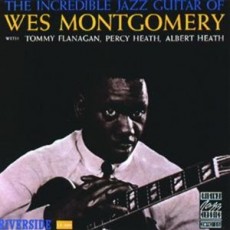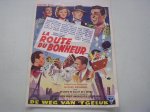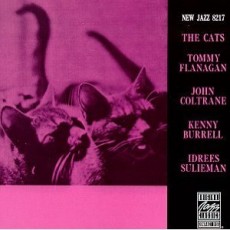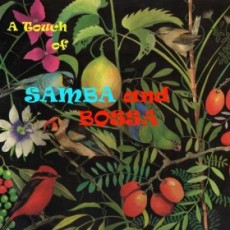
Requisites
The Incredible Jazz Guitar Of Wes Montgomery is a dazzling display of the unorthodox technique and emotional power that combined to make Wes a literally “incredible” artist. Ever since its initial release in 1960, this album has been a consensus choice of musicians, critics and knowledgeable listeners as a matchless example of the talents of one of the finest jazz instrumentalists of all times.
Personnel: Wes Montgomery – guitar, Tommy Flanagan – piano, Percy Heath – bass, Albert “Tootie” Heath – drums
Producer: Orrin Keepnews
Record Date: New York City – January 26 & 28, 1960
Cover Art: Produced and designed by Paul Bacon, Ken Braren and Harris Lewine
Songs: Airegin, D-Natural Blues, Polka Dots & Moonbeams, Four On Six, West Coast Blues, In Your Own Sweet Way, Mr. Walker (Renie), Gone With The Wind
More Posts: collectible,guitar

Jazz In Film
La Route du Bonheur (The Road To Happiness) is a 1952 film directed by Carlo Mastelli, the young radio presenter of “New Voices” has run short of ideas and his program is likely to be suspended from the radio schedule if he does not find any new ones. He is saved by chance in the person of Marina, a charming young school teacher, who takes advantage of the presence of a radio crew in her village for the recording of a singing contest to broadcast an appeal in favor of Tonino, the most underprivileged of her pupils.
Directors: Carlo Mastelli,Maurice Labro and Giorgio Simonelli
Stars: Georges Guetary, Luis Mariano and Nilla Pizzi
Musical appearances by Louis Armstrong and His Orchestra, Sidney Bechet, Claude Luter, Django Reinhardt and Hubert Rostaing.
More Posts: film

Requisites
The Cats: In the Fifties, Tommy Flanagan was one of the most highly valued pianists in jazz. His appearance on record was primarily as a sideman, well appreciated by his fellow musicians but not recognized for their display of his superior abilities by a wider audience.
This album contains a Flanagan trio track “How Long Has This Been Going On?” surrounded with the choice, empathetic soloists as Coltrane, Burrell and Sulieman. It is still a delight to hear their interaction to this day with Tommy and the all-Detroit rhythm section of Doug Watkins and Louis Hayes. Flanagan penned all of the originals on this album.
Personnel: Tommy Flanagan – piano, John Coltrane – tenor saxophone, Idrees Sulieman – trumpet, Kenny Burrell – guitar, Doug Watkins – bass, Louis Hayes – drums
Record date: Hackensack, New Jersey – April 18, 1957
Supervised by: Bob Weinstock
Songs: Minor Mishap; How Long Has This Been Going On; Eclypso; Solacium; Tommy’s Tune
More Posts: bass,collectible,drums,guitar,piano,saxophone,trumpet

notoriously Brasil
Berekere / Geraldo Azevedo – Brasileiro ♦ Cantando No Toro / Chico Buarque – Samba and Bossa ♦ Danca de Solidao / Beth Carvalho – Brasileiros ♦ Visgo De Jaca / Martinho Da Vila – Martinho Da Vila ♦ Essas Emocoes / Zeca Baliero – Por Onde Ondara Stephen Fry? ♦ Cantos Das Tres Racas / Clara Nunes – Clara ♦ Namorado Da Viuva / Jorge Ben – Electric Samba Groove ♦ Aguas De Marco (Waters Of March) / Rosa Passos – Hemispheres ♦ Vatapa / Joao Bosco – Obrigado Gente! ♦ Despedida / Celso Machado – Jongo Le ♦ Take Sarava / Silvia Torres – Silvia Torres
More Posts: brasil


